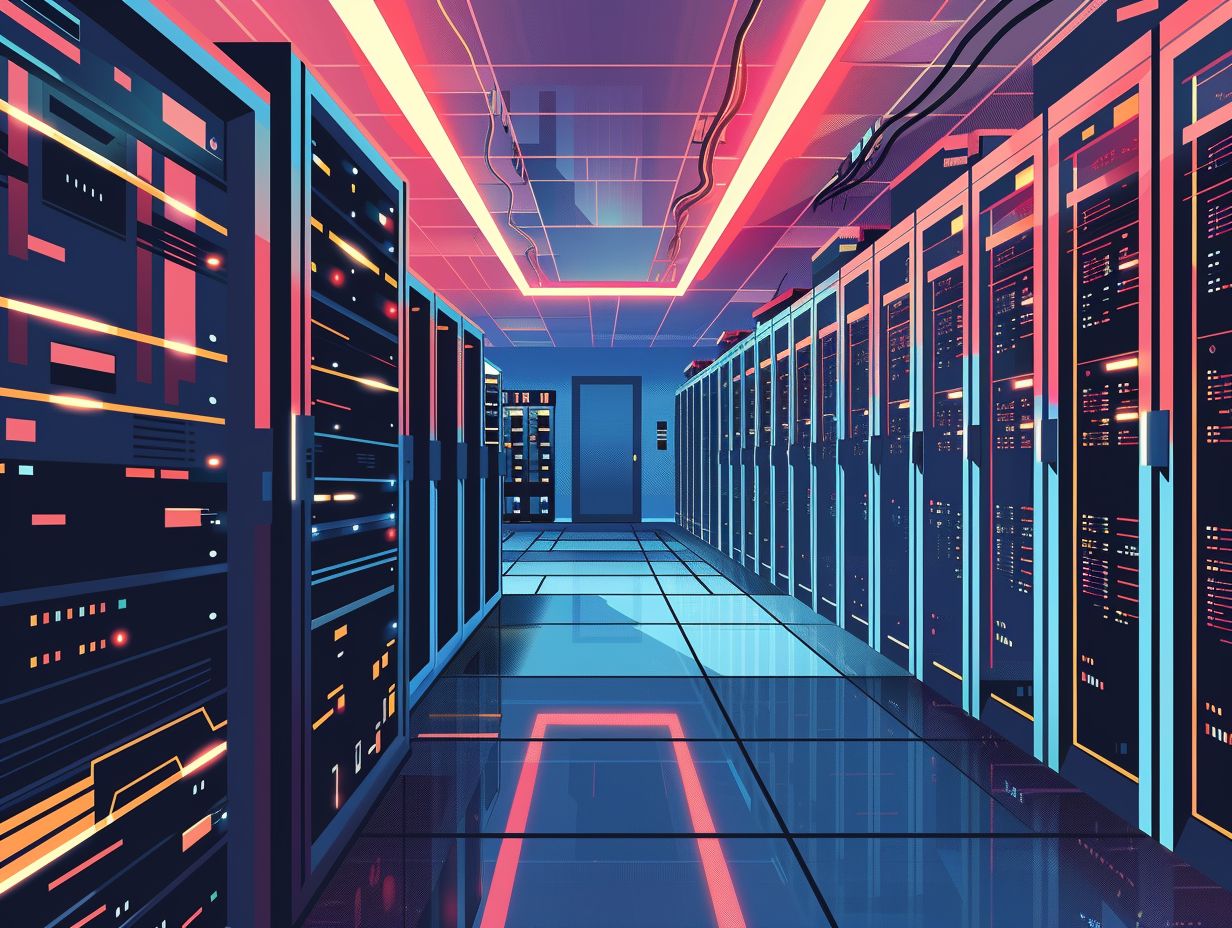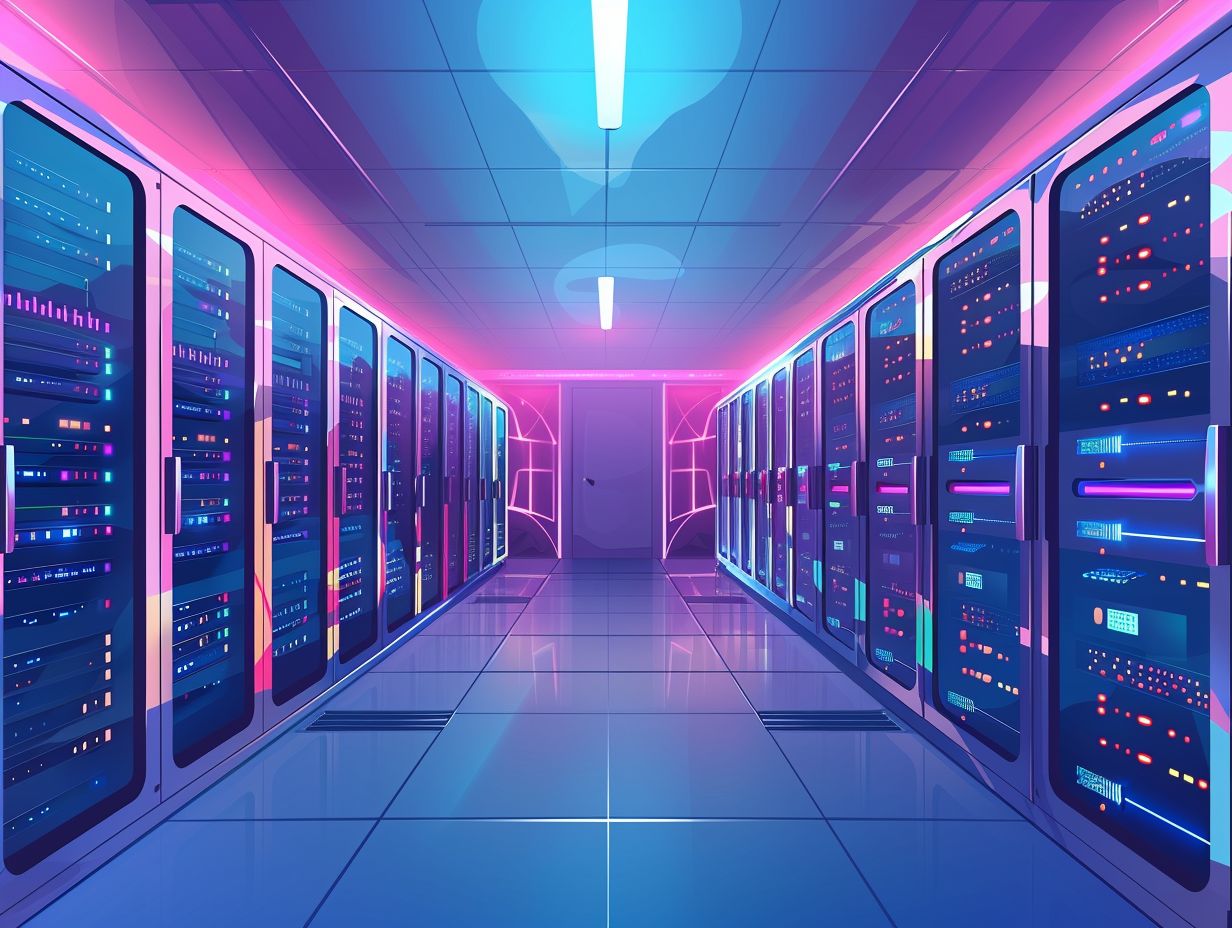In today’s digital age, data centers play a crucial role in supporting the ever-increasing demands of businesses for storage, networking, and virtualization technologies.
Delve into the key components of modern data centers, including networking infrastructure, storage solutions, and virtualization technologies. By implementing Cisco’s CCNP Data Center: Mastering Data Center Technologies, organizations can benefit from increased efficiency, scalability, and cost savings.
Whether you are preparing for CCNA certification or seeking to enhance your knowledge, this article covers relevant exam topics and resources to help you succeed in the field of data center technology.
Key Takeaways:

Defining Data Centers and Their Purpose
Data centers are centralized locations where computing and networking equipment is concentrated for the purpose of collecting, storing, processing, and distributing large amounts of data and information.
These facilities play a crucial role in supporting various digital services and applications by providing the necessary infrastructure for data management, processing, and distribution. With the exponential growth of data in today’s digital landscape, data centers serve as the backbone of modern technological infrastructure. They ensure seamless connectivity and access to information, enabling businesses to operate efficiently and deliver services to users worldwide. Through advanced technologies and robust security measures, data centers safeguard sensitive data and ensure high levels of performance and reliability in data processing operations.
Key Components of a Modern Data Center
In modern data centers, you rely on crucial components that serve as the foundation of your operations. These components include networking infrastructure, storage solutions, and virtualization technologies.
Networking Infrastructure
In data centers, the networking infrastructure includes both hardware and software components that enable communication and data transfer within the network. Technologies like Cisco’s Nexus switches and IOS operating systems are key players in this setup.
Cisco’s networking solutions are specifically designed to deliver strong and dependable connectivity, optimizing data flow and improving overall network performance. The Nexus switches, recognized for their scalability and high-speed capabilities, serve as the foundation of many contemporary data center networks. When configured with Cisco’s IOS, these switches offer advanced features like quality of service (QoS) settings, traffic prioritization, and seamless integration with other networking devices. Properly setting up IOS configurations on Nexus switches is crucial for ensuring efficient data transmission, reducing latency, and maximizing network efficiency.
Storage Solutions
Storage solutions within data centers are essential for your data retention, backup, and accessibility needs. Technologies like EMC2 provide scalable and reliable storage options tailored for enterprises like yours.
These storage solutions play a vital role in upholding the integrity and security of the vast amounts of data your organization processes daily. EMC2, among other top-tier storage technologies, offers advanced functionalities such as automated data backup, instant data recovery, and seamless integration with cloud storage services. These features not only ensure the safety of your data but also boost the overall operational efficiency within your data centers.
The scalability of these storage solutions enables your business to expand its data storage capabilities as it grows, all while maintaining peak performance and reliability.
Virtualization Technologies

In data centers, virtualization technologies play a significant role by facilitating the creation of virtual instances of servers, storage, and networks. Leading the way in virtualization solutions is platforms like VMware’s vSphere.
These technologies deliver a range of advantages to data centers, including enhanced efficiency, flexibility, and scalability. Particularly, VMware’s vSphere platform provides robust virtual machine management capabilities, enableing IT teams to efficiently provision, monitor, and manage virtualized resources.
Virtualization contributes to resource optimization by dynamically reallocating computing power and storage as required, resulting in cost savings and improved performance. Through the utilization of these technologies, organizations can streamline operations, bolster security, and effectively adapt to evolving business requirements.
Benefits of Advanced Data Center Technologies
Utilizing advanced data center technologies provides you with a myriad of benefits, including enhanced efficiency, scalability, cost-effectiveness, and the capacity to develop resilient and flexible infrastructure suitable for cloud-based solutions.
Increased Efficiency and Scalability
You benefit from increased operational efficiency and scalability through advanced data center technologies, which facilitate seamless expansion and resource allocation to address growing demands.
This enhancement in efficiency is crucial for enabling organizations to streamline operations, allocate resources more efficiently, and quickly adapt to changing market conditions. By leveraging cutting-edge technologies like virtualization, automation, and cloud computing, businesses can optimize infrastructure utilization and enhance overall performance.
Scalability strategies play a critical role in ensuring data centers can flexibly accommodate fluctuating workloads, reducing downtime and optimizing resource utilization. Ultimately, the integration of advanced technologies enables enterprises to achieve higher levels of productivity and innovation in a fiercely competitive business environment.
Cost Savings
Implementing advanced data center technologies can result in substantial cost savings for your organization. Improved resource utilization, energy efficiency, and reduced hardware maintenance requirements make this a financially prudent choice.
These modern data center solutions offer businesses the opportunity to optimize their operations, increasing productivity without the necessity for frequent hardware upgrades or continuous monitoring. By utilizing the benefits of virtualization, companies can consolidate their IT infrastructure, reducing physical space requirements and energy consumption. This not only reduces operational costs but also promotes a sustainable and environmentally friendly approach to technology management, aligning financial objectives with responsible business practices.
Implementing Advanced Data Center Technologies
Utilizing advanced data center technologies necessitates careful consideration, strategic planning, and effective leadership in order to develop and implement cutting-edge infrastructure that aligns with the changing requirements of contemporary enterprises.
Considerations and Best Practices

When you are implementing advanced data center technologies, it is crucial to take into account factors such as technology compatibility, the development of workforce skills, opportunities for career advancement, and adherence to industry best practices. These considerations are key to maximizing the benefits of adopting new technology.
It is important to ensure that the integration of technology into the existing infrastructure is seamless to achieve a successful data center transformation. Organizations should prioritize skill enhancement programs to provide employees with the necessary knowledge to effectively operate and maintain these advanced technologies.
Individuals who possess the ability to manage complex data center environments are likely to encounter significant career advancement opportunities, as the demand for skilled professionals in this field continues to grow. Adhering to industry standards and regulations not only ensures operational efficiency but also boosts the overall credibility and reliability of data center operations.
Preparing for CCNA Certification
Preparing for CCNA certification requires mastering the relevant exam topics, utilizing resources such as Cisco’s study materials, and honing the necessary networking skills to succeed in the certification exam and progress in your career as a network engineer or administrator.
Relevant Exam Topics and Resources
When preparing for CCNA certification exams, you should be ready to tackle a variety of topics that encompass networking fundamentals, routing and switching technologies, network security, and wireless networking. Resources like Cisco’s study guides and practice exams are valuable assets in your exam preparation process.
These exams will require you to have a solid understanding of key concepts such as IP addressing, subnetting, VLANs, and Ethernet technologies. Being well-versed in the OSI and TCP/IP models, configuring routers and switches, and implementing network security measures are essential aspects of the exam.
To enhance your preparation, utilize online platforms that offer virtual labs, simulation tools, and flashcards. Engaging with community forums and study groups can provide you with valuable insights and support throughout your certification journey. Hands-on practice involving real-world scenarios and troubleshooting exercises will help you master the practical elements of the certification.
Frequently Asked Questions
What is the purpose of exploring advanced data center technologies for CCNA?
Exploring advanced data center technologies for CCNA helps individuals gain a deeper understanding of the latest and most advanced technologies used in data centers, preparing them for advanced networking roles.
What are some examples of advanced data center technologies covered in CCNA?

Examples of advanced data center technologies covered in CCNA include virtualization, software-defined networking, cloud computing, and big data analytics.
How can exploring advanced data center technologies benefit my career?
Having knowledge of advanced data center technologies can make you a valuable asset in the job market, as more and more companies are adopting these technologies.
Do I need prior experience in data centers to explore advanced data center technologies for CCNA?
No, prior experience is not required. CCNA covers the fundamentals of data center technologies before delving into advanced concepts.
Can I explore advanced data center technologies for CCNA on my own?
Yes, there are many online resources and courses available for self-study. However, taking an official CCNA course can provide more structured and comprehensive learning.
What types of job roles can I pursue after exploring advanced data center technologies for CCNA?
Some potential job roles include network engineer, data center technician, cloud solutions architect, and virtualization specialist.
